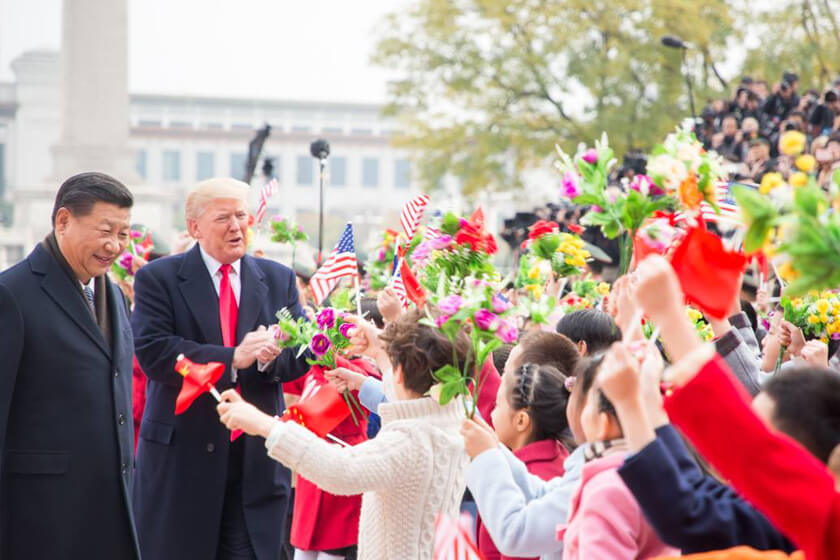West Long Branch, NJ – A year into President Donald Trump’s policy of imposing extra import duties to offset a U.S. trade imbalance, public opinion on the impact of tariffs remains divided, with few seeing an economic benefit. The latest Monmouth University Poll also finds that a majority expects that American consumers will bear the brunt of the latest round of tariffs on Chinese goods and they are not particularly hopeful that this policy will bring the manufacture of those goods back to U.S. soil.
National public opinion is divided on the issue of imposing tariffs on products imported from other countries, with 32% saying they are generally good for the U.S. and 37% saying they are generally bad. Another 32% are not sure or say it depends. Last summer, a few months after the Trump tariff policy was launched, slightly more felt tariffs were good for the U.S. (36%) while the same number said they were bad (36%). At the opposite end of the policy spectrum, free trade agreements with other countries continue to be more popular than tariffs, with 51% saying free trade is generally good for the U.S. (similar to 52% in June 2018) and just 14% saying these agreements are bad (identical to 14% last year). Another 35% are unsure or say it depends. Four years ago when the Trans-Pacific Partnership was being negotiated, public opinion on free trade agreements was evenly divided (24% good and 26% bad), while nearly half (49%) said they were not sure.
“Trump’s tariff policy has not won any converts over the past year. And now, most Americans say that they will ultimately foot the bill from a widening trade war with China,” said Patrick Murray, director of the independent Monmouth University Polling Institute.
Most Americans (62%) feel that U.S. consumers will bear the brunt of paying for new tariffs on Chinese goods. Just 23% say that Chinese producers will bear more of these costs. Likewise, 62% believe it is very likely that American companies which sell goods or use materials made in China will simply pass those costs onto domestic consumers. Another 24% say this is somewhat likely to happen and just 8% feel it is not likely. Only 24%, on the other hand, feel it is very likely that U.S. companies will bring the manufacture of these products back to the U.S. as a result of the tariffs, while 35% say this is somewhat likely to happen and 33% say it is not likely. More than 6-in-10 Americans are either very (34%) or somewhat (28%) concerned that their local economy will be hurt from a trade war with China. Just over one-third are either not too (19%) or not at all (17%) concerned about this possibility.
Regarding Trump’s policy of imposing tariffs on products imported from our trading partners in general, more Americans say this hurts (47%) rather than helps (25%) the U.S. economy. Another 7% say this has no impact and 21% are unsure. This view is more negative than public opinion last year after the president first introduced his tariff plan. Last June, 40% expected the tariffs would hurt the U.S. economy and 25% said they would help, with 7% expecting no impact and 27% being unsure.
Concerning the impact of retaliatory tariffs on U.S.-made products – 50% say tariffs on U.S. goods imposed by other countries hurt our national economy and just 8% say they help. Another 11% say that tariffs imposed by our trading partners have no impact on the U.S. economy and 32% are unsure. Last June, a similar 50% expected that tariffs on U.S. goods imposed by our trading partners would hurt the U.S. economy and 7% said they would help, with 17% expecting no impact and 26% being unsure.
The poll finds some stark, but predictable, partisan differences of opinion on all these questions. For example, 55% of Democrats and 56% of independents feel that free trade agreements are generally good for the U.S. Just 40% of Republicans agree. However, 52% of Republicans say that tariffs are good for the country, while only 34% of independents and 13% of Democrats feel the same.
Just under half of Republicans (46%) say that Trump’s tariffs help the U.S. economy while few (34%) believe that any reciprocal tariffs imposed by our trading partners hurt the country. Most Democrats feel that both policies hurt the U.S. (74% for Trump’s tariffs and 68% for retaliatory tariffs) and a plurality of independents say the same (45% for Trump’s tariffs and 47% for retaliatory tariffs). Just 33% of Republicans feel at least some concern that a growing trade war with China will hurt the local economy in their area, while most Democrats (86%) and independents (60%) are concerned about this.
While most Democrats (81%) and independents (62%) expect that American consumers will bear more of the costs from new tariffs on Chinese goods, Republicans are divided – 40% say U.S consumers will bear more of the costs and 40% say those costs will be borne more by Chinese producers. Republicans (39%) are somewhat more hopeful than independents (22%) and Democrats (15%) that the new tariffs are very likely to lead to the return of manufacturing jobs to the U.S. Just 13% of Republicans rule out this possibility, compared with one-third of independents (34%) and nearly half of Democrats (48%).
The Monmouth University Poll was conducted by telephone from May 16 to 20, 2019 with 802 adults in the United States. The question results in this release have a margin of error of +/- 3.5 percentage points. The poll was conducted by the Monmouth University Polling Institute in West Long Branch, NJ.
QUESTIONS AND RESULTS
(* Some columns may not add to 100% due to rounding.)
[Q1-19 previously released.]
[QUESTIONS 20 & 21 WERE ROTATED]
20. In general, do you think that free trade agreements with other countries are good or bad for the United States, or are you not sure?
| TREND: |
May 2019 |
June 2018 |
Nov. 2015 |
| Good | 51% | 52% | 24% |
| Bad | 14% | 14% | 26% |
| Not sure | 29% | 30% | 46% |
| (VOL) Depends | 6% | 5% | 3% |
| (n) | (802) | (806) | (1,012) |
21. In general, do you think that imposing tariffs on products imported from other countries is good or bad for the United States, or are you not sure?
| TREND: |
May 2019 |
June 2018 |
| Good | 32% | 36% |
| Bad | 37% | 36% |
| Not sure | 23% | 23% |
| (VOL) Depends | 9% | 6% |
| (n) | (802) | (806) |
22. Do you think Pres. Trump’s decision to impose tariffs on a range of products imported from our trading partners helps or hurts the U.S. economy, does it have no impact either way, or are you not sure?
| TREND: |
May 2019 |
Aug. 2018* |
June 2018* |
| Helps | 25% | 28% | 25% |
| Hurts | 47% | 38% | 40% |
| No impact | 7% | 4% | 7% |
| Not sure | 21% | 29% | 27% |
| (n) | (802) | (805) | (806) |
[*Question wording in 2018 asked whether tariffs “will help or hurt the U.S. economy.”]
23. Do you think our trading partners’ decision to impose their own tariffs on American-made products helps or hurts the U.S. economy, does it have no impact either way, or are you not sure?
| TREND: |
May 2019 |
June 2018* |
| Helps | 8% | 7% |
| Hurts | 50% | 50% |
| No impact | 11% | 17% |
| Not sure | 32% | 26% |
| (n) | (802) | (806) |
[*Question wording in 2018 asked whether tariffs “will help or hurt the U.S. economy.”]
24. Turning specifically to China, if the U.S. gets into a trade war with China, how concerned are you that this would hurt the local economy in your area – very concerned, somewhat concerned, not too concerned, or not at all concerned?
|
May 2019 | |
| Very concerned | 34% |
| Somewhat concerned | 28% |
| Not too concerned | 19% |
| Not at all concerned | 17% |
| (VOL) Don’t know | 2% |
| (n) | (802) |
25. Who do you think will bear more of the costs of these tariffs on Chinese goods – the producers in China or American consumers?
|
May 2019 | |
| Chinese producers | 23% |
| American consumers | 62% |
| (VOL) Both equally | 8% |
| (VOL) Don’t know | 8% |
| (n) | (802) |
[QUESTIONS 26 & 27 WERE ROTATED]
26. As a result of these tariffs, is it very likely, somewhat likely, or not likely that American companies which sell Chinese goods or use Chinese materials in their products will just pass the higher cost onto U.S. consumers?
|
May 2019 | |
| Very likely | 62% |
| Somewhat likely | 24% |
| Not likely | 8% |
| (VOL) Don’t know | 6% |
| (n) | (802) |
27. As a result of these tariffs, is it very likely, somewhat likely, or not likely that American companies which sell Chinese goods or use Chinese materials in their products will bring back the manufacture of these products to the United States?
|
May 2019 | |
| Very likely | 24% |
| Somewhat likely | 35% |
| Not likely | 33% |
| (VOL) Don’t know | 9% |
| (n) | (802) |
[Q28-33 held for future release.]
METHODOLOGY
The Monmouth University Poll was sponsored and conducted by the Monmouth University Polling Institute from May 16 to 20, 2019 with a national random sample of 802 adults age 18 and older, in English. This includes 322 contacted by a live interviewer on a landline telephone and 480 contacted by a live interviewer on a cell phone. Telephone numbers were selected through random digit dialing and landline respondents were selected with a modified Troldahl-Carter youngest adult household screen. Monmouth is responsible for all aspects of the survey design, data weighting and analysis. Final sample is weighted for region, age, education, gender and race based on US Census information. Data collection support provided by Braun Research (field) and Dynata (RDD sample). For results based on this sample, one can say with 95% confidence that the error attributable to sampling has a maximum margin of plus or minus 3.5 percentage points (unadjusted for sample design). Sampling error can be larger for sub-groups (see table below). In addition to sampling error, one should bear in mind that question wording and practical difficulties in conducting surveys can introduce error or bias into the findings of opinion polls.
| DEMOGRAPHICS (weighted) |
| Self-Reported |
| 25% Republican |
| 44% Independent |
| 31% Democrat |
| 48% Male |
| 52% Female |
| 31% 18-34 |
| 33% 35-54 |
| 36% 55+ |
| 64% White |
| 12% Black |
| 16% Hispanic |
| 8% Asian/Other |
| 69% No degree |
| 31% 4 year degree |
Click on pdf file link below for full methodology and crosstabs by key demographic groups.




